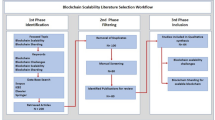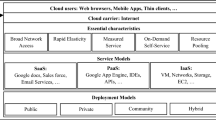Abstract
In this paper, we present an effective and efficient Byzantine-resilient dual membership management technique in cloud environments, in which nodes are prone to churn and the network topology is not fully connected. Our method is based on unstructured message communication model, namely a gossip protocol that is able to handle the dynamic behavior of nodes properly in the system. We argue that due to the presence of malicious Byzantine nodes, existing membership management mechanisms are not suitable for preserving uniformity of random sampling. Therefore, we propose a new membership management mechanism using gossip with social membership information. The proposed membership management scheme maintains not only neighbor nodes in a social graph, but also Byzantine nodes in a local data structure. The results show that our dual membership management effectively deals with Byzantine nodes, requiring only n \(\ge \) 2f + 1, where n is the number of nodes and f is the number of Byzantine nodes in the system. The message complexity is reduced from O(n \(^{2}\)) to O(n) with our proposed algorithm compared to broadcast-based algorithms.







Similar content being viewed by others
References
Aikebaier A, Enokido T, Takizawa M (2011) Tmpr-scheme for reliably broadcast messages among peer processes. Int J Grid Util Comput 2(3):175–182. doi:10.1504/IJGUC.2011.042040. http://www.inderscienceonline.com/doi/abs/10.1504/IJGUC.2011.042040
Allavena A, Demers A, Hopcroft JE (2005) Correctness of a gossip based membership protocol. In: Proceedings of the twenty-fourth annual ACM symposium on principles of distributed computing, PODC ’05, ACM, New York, pp. 292–301. doi:10.1145/1073814.1073871
Andreica MI, T\(\in \)rşa ED, Ţăpuş N, (2011) A modular framework for the development of peer-to-peer applications and services. Int J Grid Util Comput 2(3):215–233. doi:10.1504/IJGUC.2011.042044. http://www.inderscienceonline.com/doi/abs/10.1504/IJGUC.2011.042044
Arour K, Zammali S, Bouzeghoub A (2015) Test-bed building process for context-aware peer-to-peer information retrieval evaluation. Int J Space Based Situat Comput 5(1):23–38. doi:10.1504/IJSSC.2015.067980. http://www.inderscienceonline.com/doi/abs/10.1504/IJSSC.2015.067980
Bertier M, Frey D, Guerraoui R, Kermarrec AM, Leroy V (2010) The gossple anonymous social network. In: Gupta I, Mascolo C (eds) Middleware 2010, vol 6452., Lecture Notes in Computer ScienceSpringer, Berlin, pp 191–211. doi:10.1007/978-3-642-16955-7_10
Bortnikov E, Gurevich M, Keidar I, Kliot G, Shraer A (2009) Brahms: Byzantine resilient random membership sampling. Comput Netw 53(13):2340–2359. doi:10.1016/j.comnet.2009.03.008. http://www.sciencedirect.com/science/article/pii/S1389128609001182
Busnel Y, Beraldi R, Baldoni R (2011) On the uniformity of peer sampling based on view shuffling. J Parallel Distrib Comput 71(8):1165–1176. doi:10.1016/j.jpdc.2011.01.009. http://www.sciencedirect.com/science/article/pii/S0743731511000219
Chu Y, Ganjam A, Ng TSE, Rao SG, Sripanidkulchai K, Zhan J, Zhang H (2004) Early experience with an internet broadcast system based on overlay multicast. In: Proceedings of the annual conference on USENIX annual technical conference, ATEC ’04, pp. 12–12. USENIX Association, Berkeley. http://dl.acm.org/citation.cfm?id=1247415.1247427
Chun BG, Maniatis P, Shenker S, Kubiatowicz J (2007) Attested append-only memory: making adversaries stick to their word. In: Proceedings of twenty-first ACM SIGOPS symposium on Operating systems principles, SOSP ’07, ACM, New York, pp. 189–204. doi:10.1145/1294261.1294280
Correia M, Neves NF, Verissimo P (2004) How to tolerate half less one Byzantine nodes in practical distributed systems. In: Proceedings of the 23rd IEEE International Symposium on Reliable Distributed Systems. IEEE Computer Society, Washington, DC, USA, pp. 174–183. ISBN:0-7695-2239-4
Eugster PT, Guerraoui R, Kermarrec AM, Massoulieacute L (2004) Epidemic information dissemination in distributed systems. Computer 37(5):60–67. doi:10.1109/MC.2004.1297243
Gurevich M, Keidar I (2009) Correctness of gossip-based membership under message loss. In: Proceedings of the 28th ACM symposium on Principles of distributed computing, PODC ’09, ACM, New York, pp. 151–160. doi:10.1145/1582716.1582743
Haribabu K, Hota C, Paul A (2012) Gaur: a method to detect Sybil groups in peer-to-peer overlays. Int. J. Grid Util. Comput. 3(2/3):145–156. doi:10.1504/IJGUC.2012.047765
Hill R, Antonopoulos N, Berry S (2012) Peer-to-peer networks and collective intelligence: the case for agency. Int J Grid Util Comput 3(4):233–241. doi:10.1504/IJGUC.2012.051420. http://www.inderscienceonline.com/doi/abs/10.1504/IJGUC.2012.051420
Hsu TY, Kshemkalyani AD (2015) Variable social vector clocks for exploring user interactions in social communication networks. Int J Space Based Situat Comput 5(1):39–52. doi:10.1504/IJSSC.2015.067997. http://www.inderscienceonline.com/doi/abs/10.1504/IJSSC.2015.067997
Iwanicki K, van Steen M, Voulgaris S (2006) Gossip-based clock synchronization for large decentralized systems. In: Proceedings of the second IEEE international conference on self-managed networks, systems, and services, SelfMan’06, Springer-Verlag, Berlin, pp. 28–42. doi:10.1007/11767886_3
Jelasity M, Guerraoui R, Kermarrec AM, van Steen M (2004) The peer sampling service: experimental evaluation of unstructured gossip-based implementations. In: Proceedings of the 5th ACM/IFIP/USENIX international conference on middleware, Middleware ’04, Springer-Verlag New York, Inc., New York, pp. 79–98. http://dl.acm.org/citation.cfm?id=1045658.1045666
Jelasity M, Montresor A (2004) Epidemic-style proactive aggregation in large overlay networks. In: ICDCS 2004: Proceedings of the 24th international conference on Distributed computing systems (ICDCS 2004), pp. 102–109. IEEE Computer Society, Washington, DC, USA
Kamilaris A, Taliadoros G, Pitsillides A, Papadiomidous D (2012) The practice of online social networking of the physical world. Int J Space Based Situat Comput 2(4):240–252. doi:10.1504/IJSSC.2012.050007. http://www.inderscienceonline.com/doi/abs/10.1504/IJSSC.2012.050007
Kapitza R, Behl J, Cachin C, Distler T, Kuhnle S, Mohammadi SV, Schröder-Preikschat W, Stengel K (2012) Cheapbft: resource-efficient Byzantine fault tolerance. In: Proceedings of the 7th ACM European conference on computer systems, EuroSys ’12, ACM, New York, pp. 295–308. doi:10.1145/2168836.2168866
Lamport L, Shostak R, Pease M (1982) The Byzantine generals problem. ACM Trans. Program. Lang. Syst. 4(3):382–401. doi:10.1145/357172.357176
Lim J, Chung KS, Gil JM, Suh T, Yu H (2013) An unstructured termination detection algorithm using gossip in cloud computing environments. In: Kubtov H, Hochberger C, Dank M, Sick B (eds) Architecture of computing systems ARCS 2013, vol 7767., Lecture notes in computer scienceSpringer, Berlin, pp 1–12. doi:10.1007/978-3-642-36424-2_1
Lim J, Suh T, Gil J, Yu H (2014) Scalable and leaderless Byzantine consensus in cloud computing environments. Inform Syst Front 16(1):19–34. doi:10.1007/s10796-013-9460-7
Lim J, Suh T, Yu H (2013b) Unstructured deadlock detection technique with scalability and complexity-efficiency in clouds. Int J Commun Syst. doi:10.1002/dac.2638
Malatras A (2015) State-of-the-art survey on \(\{\text{P2P}\}\) overlay networks in pervasive computing environments. J Netw Comput Appl 55:1–23. doi:10.1016/j.jnca.2015.04.014. http://www.sciencedirect.com/science/article/pii/S1084804515000879
Matos M, Sousa A, Pereira J, Oliveira R, Deliot E, Murray P (2009) Clon: Overlay networks and gossip protocols for cloud environments. In: Proceedings of the confederated international conferences, CoopIS, DOA, IS, and ODBASE 2009 on the move to meaningful internet systems: part I, OTM ’09, Springer-Verlag, Berlin, pp. 549–566. doi:10.1007/978-3-642-05148-7_41
Pease M, Shostak R, Lamport L (1980) Reaching agreement in the presence of faults. J. ACM 27(2):228–234. doi:10.1145/322186.322188
Schiavoni V, Riviere E, Felber P (2011) Whisper: middleware for confidential communication in large-scale networks. In: Distributed computing systems (ICDCS), 2011 31st international conference on, pp. 456–466. doi:10.1109/ICDCS.2011.15
Sharma R, Nitin N (2014) Duplication with task assignment in mesh distributed system. J Inform Process Syst 10(2):193–214. doi:10.3745/JIPS.01.0001
Singh A, Urdaneta G, van Steen M, Vitenberg R (2012) Robust overlays for privacy-preserving data dissemination over a social graph. In: Distributed computing systems (ICDCS), 2012 IEEE 32nd international conference on, pp. 234–244. doi:10.1109/ICDCS.2012.57
Stavrou A, Rubenstein D, Sahu S (2004) A lightweight, robust p2p system to handle flash crowds. IEEE J Sel Areas Commun 22(1):6–17. doi:10.1109/JSAC.2003.818778
Tölgyesi N, Jelasity M (2009) Adaptive peer sampling with newscast. In: Sips H, Epema D, Lin H-X (eds) Proceedings of the 15th international Euro-Par conference on parallel processing, Euro-Par ’09, Springer-Verlag, Berlin, pp. 523–534. doi:10.1007/978-3-642-03869-3_50
Toosi AN, Calheiros RN, Buyya R (2014) Interconnected cloud computing environments: challenges, taxonomy, and survey. ACM Comput Surv 47(1):7:1–7:47. doi:10.1145/2593512
Veronese G, Correia M, Bessani A, Lung LC, Verissimo P (2013) Efficient Byzantine fault-tolerance. IEEE Trans Comput 62(1):16–30. doi:10.1109/TC.2011.221
Voulgaris S, Gavidia D, Steen M (2005) Cyclon: inexpensive membership management for unstructured p2p overlays. J Netw Syst Manag 13(2):197–217. doi:10.1007/s10922-005-4441-x
Wuhib F, Stadler R, Spreitzer M (2012) A gossip protocol for dynamic resource management in large cloud environments. IEEE Trans Netw Serv Manag 9(2):213–225. doi:10.1109/TNSM.2012.031512.110176
Yin J, Martin JP, Venkataramani A, Alvisi L, Dahlin M (2003) Separating agreement from execution for Byzantine fault tolerant services. In: Proceedings of the nineteenth ACM symposium on operating systems principles, SOSP ’03, ACM, New York, pp. 253–267. doi:10.1145/945445.945470
Zeilemaker N, Capotă M, Bakker A, Pouwelse J (2011) Tribler: p2p media search and sharing. In: Proceedings of the 19th ACM international conference on multimedia, MM ’11, ACM, New York, pp. 739–742. doi:10.1145/2072298.2072433
Acknowledgements
This research was supported by Basic Science Research Program through the National Research Foundation of Korea (NRF) funded by the Ministry of Education (NRF-2015R1D1A1A01061373).
Author information
Authors and Affiliations
Corresponding author
Ethics declarations
Conflict of interest
The authors declare that they have no conflict of interest.
Additional information
Communicated by V. Loia.
Rights and permissions
About this article
Cite this article
Lim, J., Chung, KS., Lee, H. et al. Byzantine-resilient dual gossip membership management in clouds. Soft Comput 22, 3011–3022 (2018). https://doi.org/10.1007/s00500-017-2553-3
Published:
Issue Date:
DOI: https://doi.org/10.1007/s00500-017-2553-3




